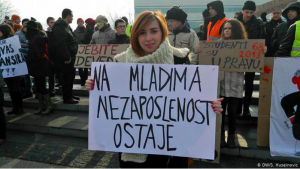The Political Situation in Bosnia. Unsolvable riddle?
All people share the same ancestry – Bosnian proverb
It has been one year since the Bosnian general elections, held at the beginning of October 2018. Yet nothing has changed. Bosnian politics has been stuck as it has not found the common ground among the ethnically driven political parties. The political gridlock on forming a new government with a prime minister has not been dismantled. Many observers note that current Bosnia has fallen into the deep political crisis, notwithstanding what the regular citizens seek. Frankly said, no one would have ever thought that after twenty-five years of several peacebuilding and post-conflict operations Bosnia had been so much divided, notably given the ethnic diversity. According to Jovana Gec from AP, ‘’an agreement between Bosnia’s Muslim, Serb and Croat leaders is crucial because the lack of a government has stalled economic development in the Balkan nation that is still recovering from a devastating 1992-95 war.’’ However, is the ethnicity the only obstacle on forming a functioning government?
Currently, one of the biggest challenges to come up with some possible solution is pro-Russian oriented Bosnian Serb Milorad Dodik (SNSD – Savez nezavisnih socijaldemokrata; Alliance of Independent Social Democrats), the Serb member of the joint tripartite presidency, with his strong national political rhetoric. Dodik has many times expressed his reluctance towards multicultural Bosnia and even has designated Bosnia as failed state and called on Republika Srpska secession. Dodik’s party also carried off the parliamentary elections in the Serb half of the country.
In contradiction with Dodik’s politics, the Croatian presidency has been taken by moderate politician Željko Komšić (DF – Demokratska fronta; Democratic Front), and Bosnian seat is occupied by Šefik Džaferović (SDA – Stranka Demokratske Akcije; Party of Democratic Action).
Nevertheless, the reason the government has not been formed so far – in order to form the joint national government, politicians from the three ethnic groups must all agree on the division of ministries and the future policies – is whether Bosnia ought to enter NATO Action Plan to become a full member of the Western military alliance. The Bosnians and Croats have several conditions to be fulfilled. However, Dodik, who’s in charge of Bosnian Serbs has strongly opposed all proposals concerning the Bosnian membership, especially due to pro-Russian orientation. Serbs are the only Kremlin allies in the Balkans so far and when Serbia declared its military neutrality Bosnian Serbs followed the suit. On the other side, Dodik has stated that he would rather except European Union goals to gain its membership.
Furthermore, despite the political gridlock, it seems that society has not lost its hope for brighter days. For instance, the Bosnian population has elected a new political party, Naša Stranka (Our Party), in the local elections in the canton of Sarajevo. Naša Stranka builds on cross-ethnic cooperation and its program focuses on solving or corruption and improving public services.
While the nationalistic political discourse and the inability to form a government prevails, Bosnia is slowly falling apart and facing even more problems. First among many is Bosnian brain drain due to the wretched economic situation. The surveys estimate that youth unemployment is approximately 50 %. One of the reasons for the weak economy is the blooming corruption which has rooted through the society over the years. Last but not least, Chris Harris from Euronews states ‘’the country’s healthcare system is collapsing, public infrastructure is struggling, and education is in a downward spiral’’. In addition to the education, Bosnia has not solved the issue of ethnically divided schools and according to Barbara Surk there are at least 50 schools around Bosnia in which students of different ethnicities are separated within the same building.
As described above, Bosnia is facing significant challenges of different kind. It seems that peacebuilding activities are still necessary and inevitable. As we could have seen, twenty-five years of systematic development for war-thorn society such as in Bosnia are still not enough to bury forever the demons of the war, especially ethnical hatreds and nationalism. Therefore, the political elites of both entities, thus Federation Bosnian and Herzegovina and Republika Srpska, should find the consensus at the earliest possible convenience. And if the membership of NATO is one of the greatest deadlocks on the political negotiations, then the endeavour to enter NATO might be postponed and taken out again when the political situation simmers down and all parties involved are opened to a deep dialogue.
Picture no. 1 – Milorad Dodik, Šefik Džaferović, Željko Komšić; Source – InfoRadar
Picture no. 2, source – Capital.ba
Written by Zdeněk Rod
1391


